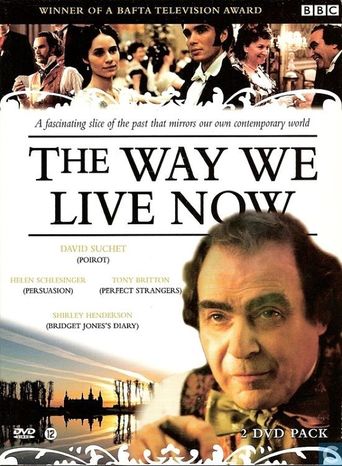selffamily
I fell across the DVD of this purely accidentally when I was perusing the shelves in our little country library. What a masterpiece! Love Trollope, but haven't read this one yet, so that is a joy in store. I was glued to this - hardly found the energy to go to my day job - and was very rude to anyone who tried to interrupt me. David Suchet is a wonderful actor, as are many of the cast. So nice to see so many of the quality British actors who don't appear in every UK movie to emerge. The mangled accent of Mrs Hertle have been abused enough, let's just say she didn't quite make it. And the Miller won his lass! It was fascinating to see the issues and prejudices of the era handled and brought out into the open, and the ravings of the desperate Melmutte at the end could almost make you sorry for the monster that he was. Ably executed, horribly addictive, and a total pleasure.Since this review, I have read the book. What a disappointment the DVD is by comparison - obviously the book is nearly 800 pages, so one was expecting cuts, less characters etc, but why was Paul Montague sent to Mexico when he never went in the book, and Ruby Ruggles!! She never did THAT in the book either - and was living with her grandfather, not her father. I understand certain changes, but my argument with major changes is why use the book at all if you wish to write your own story? A great pity, because this is an excellent production which must have been aimed that those who would never read Trollope.
George Parker
"The Way We Live Now", like most Victorian period satire, looks into the lives of numerous characters sorting through the intrigues and foibles of romance, wickedness, power, and the pursuit of peerage and property. A lightly perfumed costume flick which tilts unabashedly between comedy and drama, this story centers on a crude but rich businessman (Suchet) whose powerful performance is the backbone of the film. Side plots include an issue fraught romance, an attempt to marry into a fortune, a scheme to build a railroad from Utah to Mexico, cheating at love and cards, politics, a woman scorned, and much more. A four hour TV miniseries from the BBC, "The Way We Live Now" has plenty of time to sort through its many characters while tidying up at the end making it a busy and enjoyable Victorian period film. A should-see for anyone into BBC TV fare, Victorian period stories, and 19th century pulp fiction. (B+)
Athanatos
I found two elements of this miniseries jarring.First, Melmotte's opponent in the parliamentary election uses the phrase "pie in the sky". This is a 20th Americanism (appearing first in Joe Hill's "The Preacher and the Slave" in a 1911 IWW songbook), not something found in England circa 1870.Second, Davies has Melmotte speak out in parliament against protectionism. Why did Davies feel the need to hang the albatross of Melmotte around the neck of free trade?
MetaLark
Admiration for the abilities of screenwriter Andrew Davies led me to watch this miniseries. However, I'd have to call this a wasted effort on his part. Not having read the Trollope work on which it is based, nor having any desire to read it after viewing this film version, I can't say whether it is faithful to the original. But the main characters were generally too bizarre and unlikable for my taste, and two of the casting decisions--the parts of Paul Montague and Mrs. Hurtle--were positively grotesque.Paul Montague, the apparent hero of the piece, was supposed to be an American engineer, a person of some experience and expertise; no doubt the role called for a youngish man unaccustomed to smoky business dens, but this actor made him look like a fresh-faced adolescent--it's asking too much to suppose he could be believable in such a role. And trust me, no normal woman would fall in love with a character so effeminate--that's preposterous.And--bless my soul--Mrs. Hurtle; at first I was intrigued, thinking she was supposed to be a woman POSING as an American southern belle, a suspicious character in fact. I was astounded when it became apparent that she REALLY was supposed to be from the South; her accent was truly appalling, a caricature. A southern accent is generally so easy to mimic, it seems as though they must have searched hard for someone who couldn't do it. It was so gawd-awful that I still awaken sometimes in the middle of the night with her belabored diphthongs echoing in my nightmares.If these two mistakes had been less glaring, it is possible that the strangeness of the Melmotte characters might have been more tolerable. They certainly were interesting, and very well acted by David Suchet and Shirley Henderson. The latter has a particular gift for playing neurotic women, but she also was able to endow Marie Melmotte with some sweetness, and in the end, some sympathetic traits.4/10


